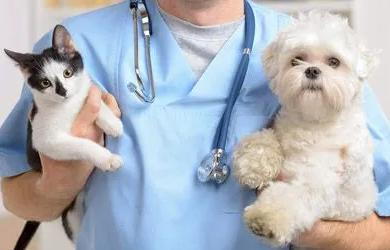Pet Surgery FAQs

- posted: Oct. 15, 2024
Whether your pet has a broken bone or a decayed tooth, he or she may need surgery. At Eglinton Dufferin Animal Clinic in York, ON, we perform various procedures, such as spaying and neutering and tooth extractions, to improve your cat or dog’s health and wellness. Here are some frequently asked questions about pet surgery:
What are the common reasons for pet surgery?
Pet surgery is often necessary for various reasons, such as injury, illness, and preventative care. Common surgeries like spaying & neutering help prevent unwanted litters and reduce certain health risks. Other reasons may include tumor removal, dental procedures, and orthopedic repairs due to fractures or joint issues.
How should I prepare my pet for a procedure?
Before surgery, our veterinarians will provide specific instructions tailored to your pet's needs. Typically, this involves fasting your pet from food and water prior to the procedure to prevent complications during anesthesia. Ensuring your furry companion is up to date on vaccinations and discussing any pre-existing conditions with our vets is also essential.
What happens during the surgery?
During surgery, your pet will be carefully monitored by our trained staff. Anesthesia is administered to make sure your cat or dog remains comfortable and pain-free throughout the procedure. The surgical area is sterilized and we perform the necessary operation with precision and care. After surgery, your pet will be closely monitored to ensure a smooth transition back to normalcy.
What are the risks associated with pet surgery?
Like any medical procedure, pet surgery carries risks. These may include reactions to anesthesia, infection at the surgical site, or complications associated with underlying health conditions. We will discuss these risks with you beforehand and take necessary precautions to minimize them.
How can I help my pet recover?
After surgery, follow our veterinarians’ post-operative care instructions diligently. This may include administering medications, keeping the surgical site clean and dry, and restricting your pet's activity as advised. Providing a quiet, comfortable environment for recovery will help facilitate a speedy recuperation.
When should I contact my veterinarian?
It's important to stay vigilant post-surgery. Contact our vets immediately if you notice any concerning symptoms such as excessive bleeding, difficulty breathing, or signs of pain. Early intervention can often resolve issues before they become more serious.
Contact Us for an Appointment Today
Navigating pet surgery can be challenging, but with the right information and support, you can make informed decisions for his or her health. If you have more questions or need to schedule a consultation, call Eglinton Dufferin Animal Clinic in York, ON, at (647) 352-2201 today. Our experienced team is here to provide compassionate care and expert guidance for your pet's needs.

- posted: Oct. 15, 2024
Whether your pet has a broken bone or a decayed tooth, he or she may need surgery. At Eglinton Dufferin Animal Clinic in York, ON, we perform various procedures, such as spaying and neutering and tooth extractions, to improve your cat or dog’s health and wellness. Here are some frequently asked questions about pet surgery:
What are the common reasons for pet surgery?
Pet surgery is often necessary for various reasons, such as injury, illness, and preventative care. Common surgeries like spaying & neutering help prevent unwanted litters and reduce certain health risks. Other reasons may include tumor removal, dental procedures, and orthopedic repairs due to fractures or joint issues.
How should I prepare my pet for a procedure?
Before surgery, our veterinarians will provide specific instructions tailored to your pet's needs. Typically, this involves fasting your pet from food and water prior to the procedure to prevent complications during anesthesia. Ensuring your furry companion is up to date on vaccinations and discussing any pre-existing conditions with our vets is also essential.
What happens during the surgery?
During surgery, your pet will be carefully monitored by our trained staff. Anesthesia is administered to make sure your cat or dog remains comfortable and pain-free throughout the procedure. The surgical area is sterilized and we perform the necessary operation with precision and care. After surgery, your pet will be closely monitored to ensure a smooth transition back to normalcy.
What are the risks associated with pet surgery?
Like any medical procedure, pet surgery carries risks. These may include reactions to anesthesia, infection at the surgical site, or complications associated with underlying health conditions. We will discuss these risks with you beforehand and take necessary precautions to minimize them.
How can I help my pet recover?
After surgery, follow our veterinarians’ post-operative care instructions diligently. This may include administering medications, keeping the surgical site clean and dry, and restricting your pet's activity as advised. Providing a quiet, comfortable environment for recovery will help facilitate a speedy recuperation.
When should I contact my veterinarian?
It's important to stay vigilant post-surgery. Contact our vets immediately if you notice any concerning symptoms such as excessive bleeding, difficulty breathing, or signs of pain. Early intervention can often resolve issues before they become more serious.
Contact Us for an Appointment Today
Navigating pet surgery can be challenging, but with the right information and support, you can make informed decisions for his or her health. If you have more questions or need to schedule a consultation, call Eglinton Dufferin Animal Clinic in York, ON, at (647) 352-2201 today. Our experienced team is here to provide compassionate care and expert guidance for your pet's needs.
Location and Hours
1540 Eglinton Ave W York, ON M6E 2G8
Monday
9:00 am - 5:00 pm
Tuesday
9:00 am - 5:00 pm
Wednesday
9:00 am - 5:00 pm
Thursday
9:00 am - 5:00 pm
Friday
9:00 am - 5:00 pm
Saturday
10:00 am - 3:00 pm
Sunday
Closed
